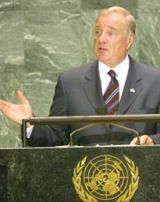Canada’s Martin insists Sudan respect UN resolution
By CAMPBELL CLARK
OUAGADOUGOU, Burkina Faso, Nov 25, 2004 (The Globe and Mail) — On the eve of a one-day mission to Sudan, Prime Minister Paul Martin issued a stern warning to the country’s government to respect a UN resolution calling for a ceasefire by the end of the year, and to allow more humanitarian aid.
 Mr. Martin arrives in Khartoum today where he will put pressure on the government, meet officials from the United Nations and aid organizations, and visit a camp for displaced persons.
Mr. Martin arrives in Khartoum today where he will put pressure on the government, meet officials from the United Nations and aid organizations, and visit a camp for displaced persons.
The UN Security Council last week travelled to Nairobi for a special session where it issued the ceasefire call. That resolution backed a call from the African Union for an end to internal violence.
Mr. Martin said Wednesday that the international community will demand that the Sudanese government abide by the resolution, let in more aid and accept African Union peacekeepers.
“The main point is that the Security Council met in Africa and said that there has to be an agreement by the year-end. We will insist upon that,” he said at the opening of a primary school in Tanghin, Burkina Faso, as leaders arrived for the Francophonie summit.
“We will insist that humanitarian aid be open to all of the Sudan, not simply specific regions.” Sudan has been racked by decades of a civil war between the government in Khartoum and separatist rebels in the south. More recent violence by government-backed Muslim janjaweed militias in the western Sudan region of Darfur has displaced more than a million people.
The Sudanese government backed the janjaweed, and is accused of failing to stop their intimidation and violence.
Mr. Martin is to meet Sudanese President Omar Hassan Ahmad al-Bashir, as well as the Vice-President. He said yesterday that a personal visit is necessary even though the Sudanese President is expected at the Francophonie summit this week.
“I want to also meet the [non-governmental organizations] that are there. I also want to meet the representatives on the United Nations. . . . Unfortunately, I will not have the time to go to Darfur, but I will, at any rate, go to one camp to see for myself.
“And I must say that I think it is important for the Sudanese to understand that the international community insists – I mean insists – on the Security Council resolution.”
Mr. Martin’s one-day trip to Sudan has been slotted into a 10-day trip that includes the Asia-Pacific Economic Co-operation Summit in Chile and an official visit to Brazil.The summit, in the Burkina Faso capital of Ouagadougou, is expected to focus on violence in neighbouring Ivory Coast, where the government has fought with rebels after a backlash over French retaliation for the killing of nine peacekeepers.
Mr. Martin said he wants the Francophonie to adopt a firm resolution backing a UN call for an end to violence in Ivory Coast. Officials later said the Francophonie is expected for the first time to invoke a declaration that would lead to suspension or expulsion of members that do not respect human rights.
Mr. Martin said Canada will also push the organization for stronger action to aid Haiti.
The three-room schoolhouse Mr. Martin opened on the first morning of his trip to Africa was built partly with Canadian aid.
Burkina Faso is one of the poorest countries in the world, with an average per capita income of $460 a year. Shacks smaller than most Canadian bedrooms line the dusty road from Ouagadougou to Tanghin, 20 kilometres away, but the Prime Minister insisted that the government’s focus on primary education is a symbol of hope.
“I can’t think of a better start than to come to a school. I think it also symbolizes that Africa is a large continent and not all countries are the same,” he said.
The government of President Blaise Campaoré, who first came to power in a coup, has launched a 10-year program to provide primary school education to all children, with aid from France, Canada, and other countries.
Mr. Martin told local reporters that Canadian aid will continue for education and health projects.
But Bloc Québécois Leader Gilles Duceppe, who is attending the Francophonie summit as an observer, noted that Canada has cut international aid since the Liberals took office.
“Beyond the hopes expressed by Mr. Martin, there is reality,” Mr. Duceppe said. “We cut half. So it’s very nice, we want to help, but if we cut half, we help less.”
